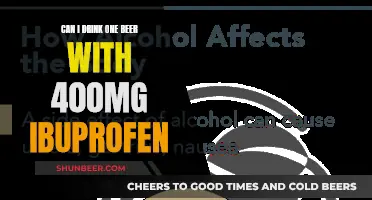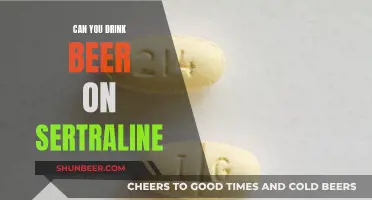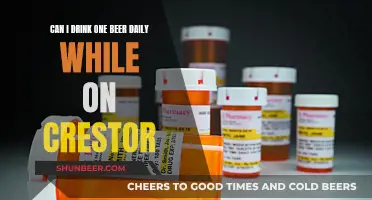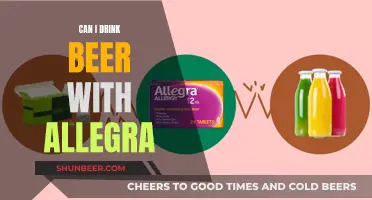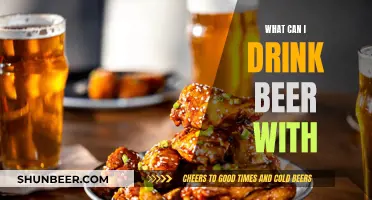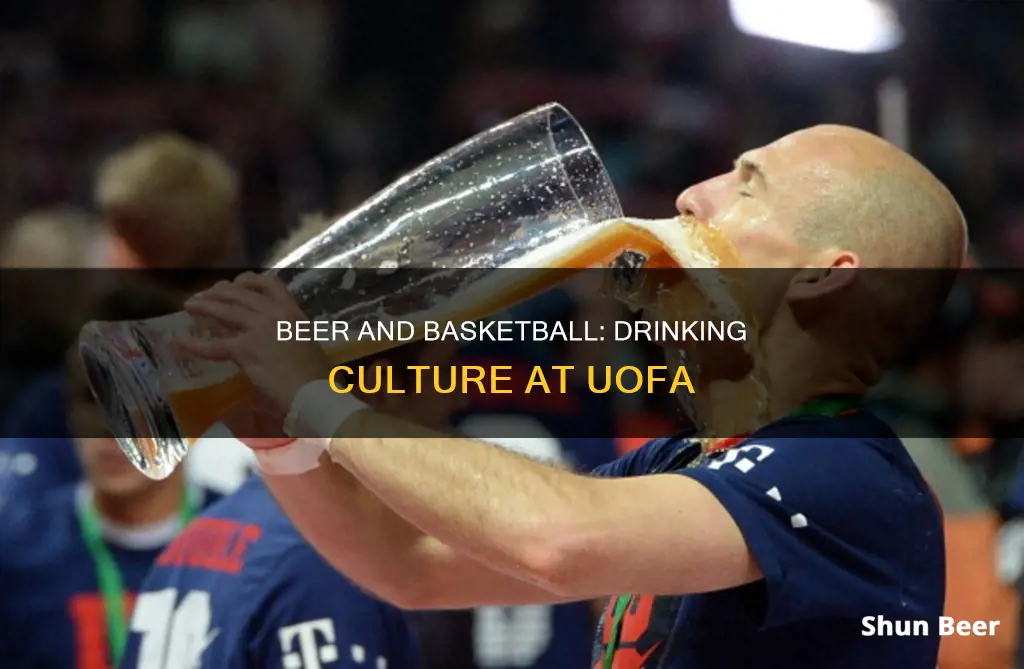
The University of Arizona Wildcats' basketball arena, the McKale Center, has been approved to sell beer and wine during games. The Tucson City Council approved a liquor license for the University of Arizona, and the Arizona State Liquor Board also gave the proposal a green light. This decision was influenced by numerous requests from fans and is expected to enhance the fan experience. While some universities have been slow to implement alcohol sales, the trend indicates an increasing number of colleges and universities allowing alcohol sales during sporting events to boost revenue and attract fans.
| Characteristics | Values |
|---|---|
| Alcohol availability | Beer and wine are available for purchase at the University of Arizona's McKale Center |
| Alcohol control policies | Alcohol servers are required to check the age identification of patrons who appear younger than 30 |
| Alcohol service | The university contracted with a third-party company to serve alcohol |
| Alcohol sales impact | The decision to sell alcohol is intended to enhance the fan experience rather than generate significant additional revenue |
| Alcohol sales locations | Alcohol is sold at designated concessions within the basketball arena |
What You'll Learn
- Beer and wine are sold at the University of Arizona's basketball games
- Alcohol sales at college sports games have increased revenue
- Alcohol is often heavily advertised and sold at sporting events
- Alcohol control policies are implemented at stadiums to reduce alcohol-related problems
- The University of Arizona's McKale Center was approved to sell beer and wine

Beer and wine are sold at the University of Arizona's basketball games
The proposal to sell alcohol at the University of Arizona's basketball games was initially put forward by the university's athletic director, Dave Heeke, who stated that the decision was made to enhance the fan experience rather than to generate additional revenue. The university contracted with a third-party company to sell and serve alcohol, as they do for baseball games at Hi-Corbett Field.
The University of Arizona is not the only institution to have made this decision. In recent years, there has been a boom in alcohol sales at college sporting events, with more schools allowing fans to enjoy a drink while watching the game. According to a survey by the Associated Press, 80% of Power Five conference schools now sell alcohol in the public areas of their stadiums on game days. This shift can be attributed to loosened rules by the NCAA and conferences, allowing universities to sell alcohol more freely.
However, it is important to note that not all universities have followed this trend. Some schools, like Clemson University, do not sell alcohol in their stadiums but allow fans with premium tickets to bring their own drinks to private seating areas. Additionally, the University of Michigan, known for its strong basketball and hockey teams, does not allow alcohol anywhere in its stadium or arena.
The sale of beer and wine at the University of Arizona's basketball games is a recent development, reflecting a broader trend of colleges and universities across the country relaxing their restrictions on alcohol sales during sporting events.
Beer and Aleve: A Safe Mix?
You may want to see also

Alcohol sales at college sports games have increased revenue
Alcohol sales at college sports games have become increasingly common in recent years, with the NCAA and conferences loosening rules and allowing universities to sell alcohol. This shift has been driven by the desire to ""bring in more revenue and attract fans into the venues," and it has been met with varying responses from universities and the public.
The University of Arizona (UofA) serves as an example of this trend. In 2018, the Arizona State Liquor Board approved a proposal to sell beer and wine at the UofA basketball arena, the McKale Center. This decision was made despite some public protest against the proposal. University officials emphasized that the primary goal of alcohol sales was to ""enhance the fan experience" rather than significantly boost revenue.
The financial impact of alcohol sales at college sports games can be significant. For instance, West Virginia University generated an additional $700,000 in revenue after implementing in-stadium alcohol sales in 2011. The University of North Carolina also reported a positive impact on its bottom line, with about $4 million in alcohol sales. These additional funds can be crucial for universities seeking new revenue streams.
However, the impact of alcohol sales on the overall fan experience and public health is more complex. While some studies suggest that alcohol sales can lead to increased emergency department visits and public health concerns, others indicate that responsibly managed sales may not adversely affect public health. For example, a study at a large Midwestern university found that in-stadium alcohol sales had no significant impact on the frequency or proportion of alcohol-related emergency medical services calls or emergency department visits.
The debate around alcohol sales at college sports games continues, with some universities embracing the potential revenue boost and others expressing concern over possible negative consequences. As universities navigate this complex issue, the primary focus remains on balancing financial opportunities with the well-being and safety of fans and students.
Breastfeeding and Beer: Is It Safe to Drink Alcohol?
You may want to see also

Alcohol is often heavily advertised and sold at sporting events
Alcohol companies invest heavily in sports sponsorships, with 30 of the leading alcoholic beverage brands spending a combined $764.5 million on sports sponsorships in 2018. Alcohol sponsorships are a powerful promotional tool, as they can transfer positive associations from the sport to the brand, and neutralise negative associations, such as health and social harms. Exposure to alcohol advertising and sponsorship messaging in sports has been linked to increased levels of consumption, including among children.
Alcohol advertising and sponsorship are common in Australian sports, particularly in popular sports such as Australian rules football, rugby league, and cricket. In 2018, alcohol brands sponsored approximately two-thirds of these sports. In France, the Loi Évin law passed in 1991 restricted tobacco and alcohol advertising. However, alcohol companies were able to circumvent this law and continue sponsoring sporting events by using indirect marketing techniques, such as using specific colours and phrases associated with their brand.
Public health professionals have raised concerns about the impact of alcohol advertising and sponsorship in sports. Studies have found positive associations between exposure to alcohol sports sponsorship and increased levels of self-reported consumption, including among children and young people. There are also concerns about the impact on athletes themselves, as participation in sports is already linked to higher levels of alcohol consumption.
Counter-advertising campaigns that expose alcohol sponsorship and harms have been suggested as a strategy to increase public support for policies restricting alcohol sponsorship in sports. Evaluations of similar campaigns in the tobacco industry have shown positive results in shifting beliefs about the industry and increasing support for tobacco control policies.
Drinking Beer in Penn Station: What's Allowed?
You may want to see also

Alcohol control policies are implemented at stadiums to reduce alcohol-related problems
A study by Lenk et al. surveyed food and beverage managers from 66 US professional sports stadiums, including those that host basketball games. The survey found that most stadiums had a range of alcohol control policies and practices in place. For example, nearly all stadiums limit the number of alcoholic beverages per sale to two and require their servers to check the ID of patrons who appear under 30. However, only about half prohibit servers under 21 from selling alcohol, and only about a third designate alcohol-free sections.
The National Basketball Association has implemented several alcohol control policies, including a ban on alcohol sales at the start of the fourth quarter, a limit of two drinks per purchase, and a limit on drink size to 24 ounces.
The University of Arizona (UofA) is one example of a university that has received state approval to sell beer and wine at its basketball arena, the McKale Center. The university plans to contract with a third-party company to sell and serve the alcohol.
In recent years, the NCAA and conferences have loosened rules around alcohol sales, and several athletic departments now allow anyone in attendance to buy a drink. However, there are still a handful of college football stadiums that don't serve alcohol, and in some states, alcohol is not allowed to be sold at FBS games.
Beer Drinking at Target Field: Family Section Rules
You may want to see also

The University of Arizona's McKale Center was approved to sell beer and wine
The sale of alcohol at college sports games has undergone a significant transformation in recent years. Initially, it was rare to find alcohol being sold at college sporting events, and those that did allowed sales only in premium seating areas. However, in recent times, the NCAA and conferences have relaxed their rules, allowing universities to sell alcohol more freely. This shift has resulted in a notable increase in alcohol sales at college sports stadiums, with 88% of FBS schools selling alcohol during the 2023 season.
The University of Arizona's decision to sell beer and wine at the McKale Center is part of a broader trend among universities to enhance the fan experience and bring in more revenue. While some universities are still cautious about selling alcohol on campus, many have recognised the potential benefits of this decision.
It is worth noting that the University of Arizona is considering expanding alcohol sales to the Arizona Stadium for football games, but no concrete plans have been announced. The university joins a growing list of educational institutions that are re-evaluating their alcohol policies and choosing to prioritise fan experience and revenue generation.
Mixing Beer and Liquor: Safe or Not?
You may want to see also
Frequently asked questions
Yes, the University of Arizona's McKale Center has been approved to sell beer and wine to fans during basketball games.
Yes, there may be restrictions on the number of alcoholic drinks that can be purchased at one time. This can vary depending on the stadium and their alcohol control policies, but it is typically limited to two or three drinks per purchase.
No, beer and other alcoholic drinks must be purchased from the designated concessions within the arena. Only some schools allow fans with premium tickets to bring their own drinks to private seating areas.


